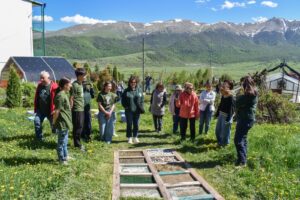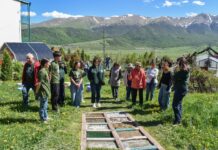VENICE — Rouben Koulaksezian’s name is known to many Armenians, especially in diaspora. Born in 1989 in Paris, to an Armenian father and a French mother, Rouben studied at the ESSEC Business School and Université Paris 1 Panthéon-Sorbonne. He is known for his “Little Armenias” project founded in 2018 with the aim of forging links between Armenian communities around the world, and more particularly by creating educational content on social networks, to reach younger people. The result is the publication of Little Armenias. Your Travel Guide in the Armenian Diaspora guidebooks in English and French, covering Armenian sites in more than 100 countries. By the way, on September 17, 2020 Mirror-Spectator editor Alin K. Gregorian wrote about the initial volume.
After a brief meeting in Yerevan I met Rouben again in last August in Venice, where he came to present his book to the participants of the 38th edition of the Intensive Summer Course of Armenian Language and Culture of the Association Padus-Araxes.
Dear Rouben, my long contacts with the diaspora show that there are not many French Armenians who have the same Armenian language skills or links to Armenia as you. What is your biggest motivation in keeping your Armenian identity so strong?
I agree that French Armenians tend to assimilate quicker than other diasporas, but I think that in the case of my family, even if we are a family that came to France in 1930 from Aleppo, we always tried to transmit the Armenian identity to the next generations. I can say that my biggest motivation is this family heritage, when I imagine my ancestors being proud of what I’m doing, I understand it’s the right path.
You speak a number of languages. Many think there is no need to study a language with limited usage such as Armenian. How do you counter that?
I have many stories of random situations where the Armenian language, that I learned as a young adult, was really helpful. Actually, even speaking a few words creates a connection with other Armenians anywhere in the world. As we say in Armenian, “The more languages you know, the more persons you are.” It’s important to understand concepts in the language of your ancestors. I’d be very frustrated if I was in a situation where, hypothetically, if I could meet my great-grandfather, I’d had no common language to talk to him.









